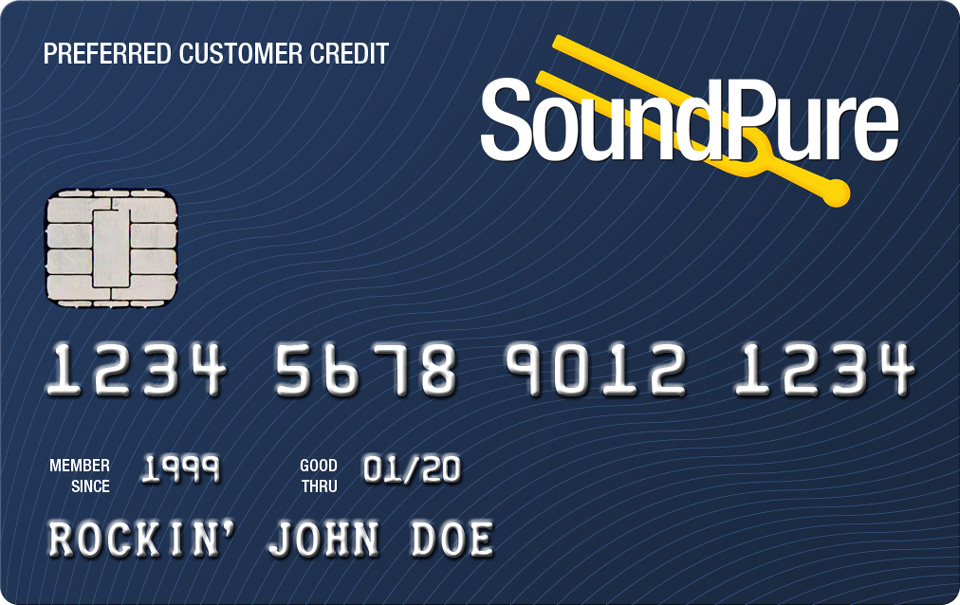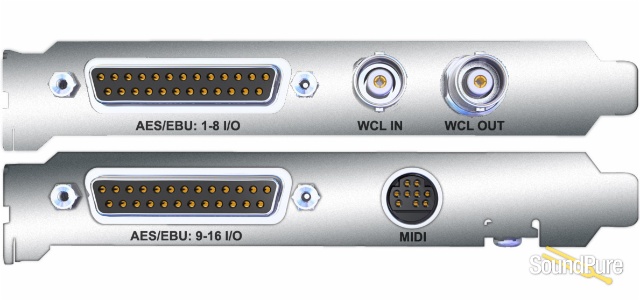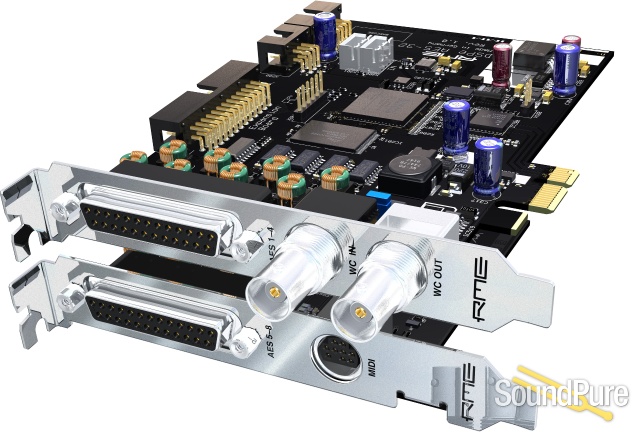-
Call Us Toll Free888-528-9703
-
Local/International (+1)919-682-5552
- Call Us! Toll Free! 888-528-9703
- Local / International (+1) 919-682-5552

$1,249.00
Retail: $1,449.00
"Experience the Difference"
 Payments as low as $28/mo.
Payments as low as $28/mo.
Manufacturer's Description from RME
The HDSPe AES is a short-length PCI Express card with AES/EBU interfaces. It provides eight AES inputs (16 channels) and eight AES outputs (16 channels) at 192 kHz sample rate. The card is also equipped with two MIDI I/O ports, word clock I/O, and can be used with the optional TCO module for synchronization to LTC and video.
The HDSPe AES is RMEs reaction to requests from audio professionals for an AES-based solution with the typical RME features and quality. This audio card is a perfect all-in-one solution for professional users in the fields of broadcast, TV, theater, stage/PA - and in any professional studio.
The card's mainboard contains word clock I/O and a 25-pin D-sub connector, providing four AES inputs and four AES outputs via standard digital breakout cable (Tascam pinout). The sensitive word clock input operates on Single, Double and Quad Speed signals automatically. The expansion board adds audio channels 9-16 and a connector for a MIDI breakout Cable with two MIDI I/Os (four 5-pin DIN connectors). It does not require a PCIe slot.
The card is not based on a PCI to PCI Express bridge, which would simply add PCIe to existing PCI technology. It is a newly developed genuine PCI Express solution, which consequently takes full advantage of the new format, achieving significant performance gains in multitrack audio and lowest latency.
The AES' remarkable features include:
Support for 192 kHz at full channel count
Native support for Double and Quad Wire transfer
Direct conversion between these formats
SteadyClock for highest jitter suppression and clock regeneration
Intuitive and clearly laid-out user interface
TotalMix: 512 channel mixer with 42 bit internal resolution
48 level meter Peak/RMS, hardware-computed
The DSP-based TotalMix mixer enables the AES to route and mix all 16 inputs and 16 playback channels to all 16 physical outputs freely, offering extraordinary monitoring capabilities. Up to 8 fully independent stereo submixes can be created. Routings can be copied and pasted, faders ganged and grouped, which, along with the amazing matrix window, turns the AES into a powerful and easy-to-use redistributor, patchbay, router, converter, and splitter. The hardware-based mixer is fully MIDI-controllable. Furthermore, the DSP hardware calculates RMS and peak level meters for all 48 audio channels, with no measurable CPU load.
The Time Code Option can be used with the HDSPe AES to sync to LTC and video. Thanks to SteadyClock(TM), the TCO not only extracts absolute positions from LTC, but also a very clean low-jitter word clock from LTC and video.
The card's most important settings are stored on the card itself. Rather than operating in a default mode from the moment the computer is switched on until the driver is loaded, the card will immediately activate the last used sampling rate, master/slave configuration and AES format, thus eliminating any startup noise or problems in the clock network, both at system start and reboot.
An optional 19" breakout box is also available. Its innovative design features XLR I/Os that can be accessed from the front or rear in a rack, according to the user's choice. BOB-32 provides D-sub connectors with Tascam and Yamaha pinout, therefore can be used with other devices as digital rack breakout box as well.
Included software:
DIGICheck for Windows: Spectral Analyser, professional level meter for 2, 8, or 16 channels, Vector Audio Scope, various other audio analysis tools.
Drivers: Windows 2000/XP/Vista/64 (full ASIO multi-client operation of WDM, GSIF 2.0 and ASIO 2.0), Mac OS X Intel (Core Audio and Core MIDI).
Thanks to RME's flash update technology, future firmware improvements, adjustments, and bugfixes can be installed easily at any time.
The PCI Express interface of the HDSPe system is based on the PCI Express Base Specification v 1.1. It represents a 1-Lane PCI Express Endpoint Device and supports 2.5 Gbps line speed. Thanks to the packet-based full duplex communication, the card provides a transfer rate of up to 500 MB/s - 250 MB/s in every direction

About Manufacturer
RME is a young German team of developers with a robust vision of creating innovative, user friendly, and high-quality digital audio solutions for less money. Founded in 1996, RME quickly earned their stripes as a premiere industry provider, expanding rapidly into mainstream international markets. Each developer on the RME team is either a musician or sound engineer - besides being a specialist in hardware and software development. Additionally, to give their designs a persistent competitive edge in today's market, RME developers regularly network with other industry specialists to exchange knowledge and information - truly designing a line of products with superior quality, and affordable, mass-market appeal. RME has had a consistent string of successful product releases, earning awards and accolades from the press and the public alike. The enthusiastic response and worldwide support the RME product line has generated ranks them one of the top audio device companies in the industry.
Specifications
1-Lane PCI Express Endpoint device (no PCI Express to PCI Bridge), revision 1.1.
2.5 Gbps line speed
Packet-based full-duplex communication (up to 500 MB/s transfer rate)
All settings: changeable in real-time
Automatic and intelligent master/slave clock control
Enhanced Zero Latency Monitoring for latency-free submixes and perfect ASIO Direct Monitoring
Sync sources: 8 x AES, word clock, internal
Varipitch: by input signal or word clock
Sample rates: 32 kHz up to 192 kHz, variable (Sync/word clock)
Sample rate range: AES: 28 kHz - 204 kHz, word clock: 28 kHz - 204 kHz
Jitter: < 1 ns, internal and all inputs
Jitter sensitivity: PLL operates even at 100 ns Jitter without problems
Comes with DIGICheck: the ultimate measurement, analysis and test tool
Input: 8 x AES, 2 x MIDI, word clock (BNC)
Output: 8 x AES, 2 x MIDI, word clock (BNC)
Input word clock: BNC, Signal Adaptation Circuit (functional from 1.2 Vpp input signal), termination via jumper
Output word clock: BNC, low-impedance driver stage, 4 Vpp into 75 Ohms, short-circuit-proof
MIDI input and output: via four 5-pin DIN jacks













